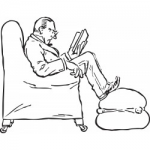
Il vecchio lettore |
Una delle più grottesche scimmiottature a ricalco dell’americano che ormai dilaga, divenendo irreparabile, è l’abolizione dell’articolo determinativo davanti alle denominazioni delle imprese e delle fondazioni, come se si trattasse di nomi di persona.
* * *
Il problema della traduzione è, per parafrasare Clemenceau, cosa troppo seria per lasciarlo gestire solo ai linguisti e ai critici letterari.


